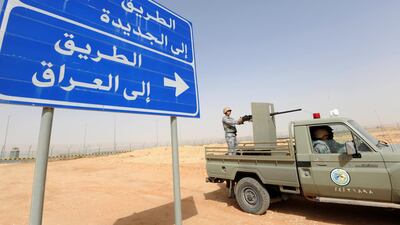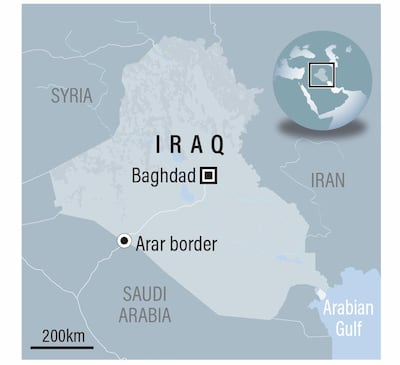The Iraqi-Saudi border crossing is expected to officially reopen on October 15, the kingdom’s ambassador to Baghdad said on Tuesday.
The Arar entry point was closed in 1990 after relations soured between the two states when dictator Saddam Hussein invaded Kuwait.
The announcement, made by Saudi Arabian Ambassador Abdul Aziz Al Shammari, reflects strengthening relations between the two neighbours.
Talk of the border opening has been happening for several years with the aim of boosting trade relations.
The development will allow Iraq to return to its Arab heritage and encourage other Arab states to increase their presence in the country, Jaber Al Jaberi, a member of the Iraqi parliament told The National.
"It will also increase trade between the two countries, promote the private sector and encourage Saudi investments in Iraq," he said.
The reopening of the border will assist Iraqi pilgrims travelling to the Kingdom to perform their religious duties without any complications, Mr Al Jaberi said.
“We thank His Majesty the Custodian of the Two Holy Mosques, King Salman, for his assistance in building the Arar border port and for the facilities it will provide to the Iraqi public."
The Saudi-Iraqi rapprochement extends back to 2015, when Riyadh reopened its embassy in Baghdad after a quarter-century break.
The visit by Adel Al Jubeir, who was then the kingdom’s foreign minister, to the Iraqi capital in February 2017 marked a turning point in relations.
Both the UAE and Saudi Arabia have been working to strengthen their ties with Iraq to halt the growing regional influence of Iran.
Baghdad is seeking economic benefits from closer ties with Riyadh and Abu Dhabi.
The UAE announced in April last year it would finance a $50.4 million (Dh185.1m) project to rebuild Mosul’s Grand Al Nuri mosque.
The building, famous for its leaning minaret, was blown up by ISIS.
In October 2017, two months before Iraq declared victory over the terrorist group, the Iraqi-Saudi Joint Coordination Council was established to help rebuild devastated areas in Iraq.
The council is seen as a platform for joint communication between the two countries to discuss "all relevant challenges and to prepare the required visions for the future, as well as to find solutions for different issues through a consolidated vision," Saudi trade minister, Majid bin Abdullah Al Qasabi said in October 2017.
The re-opening of the Arar border is seen as the "foundation for a fruitful cooperation" between Saudi and Iraq, Mr Al Qasabi said.



